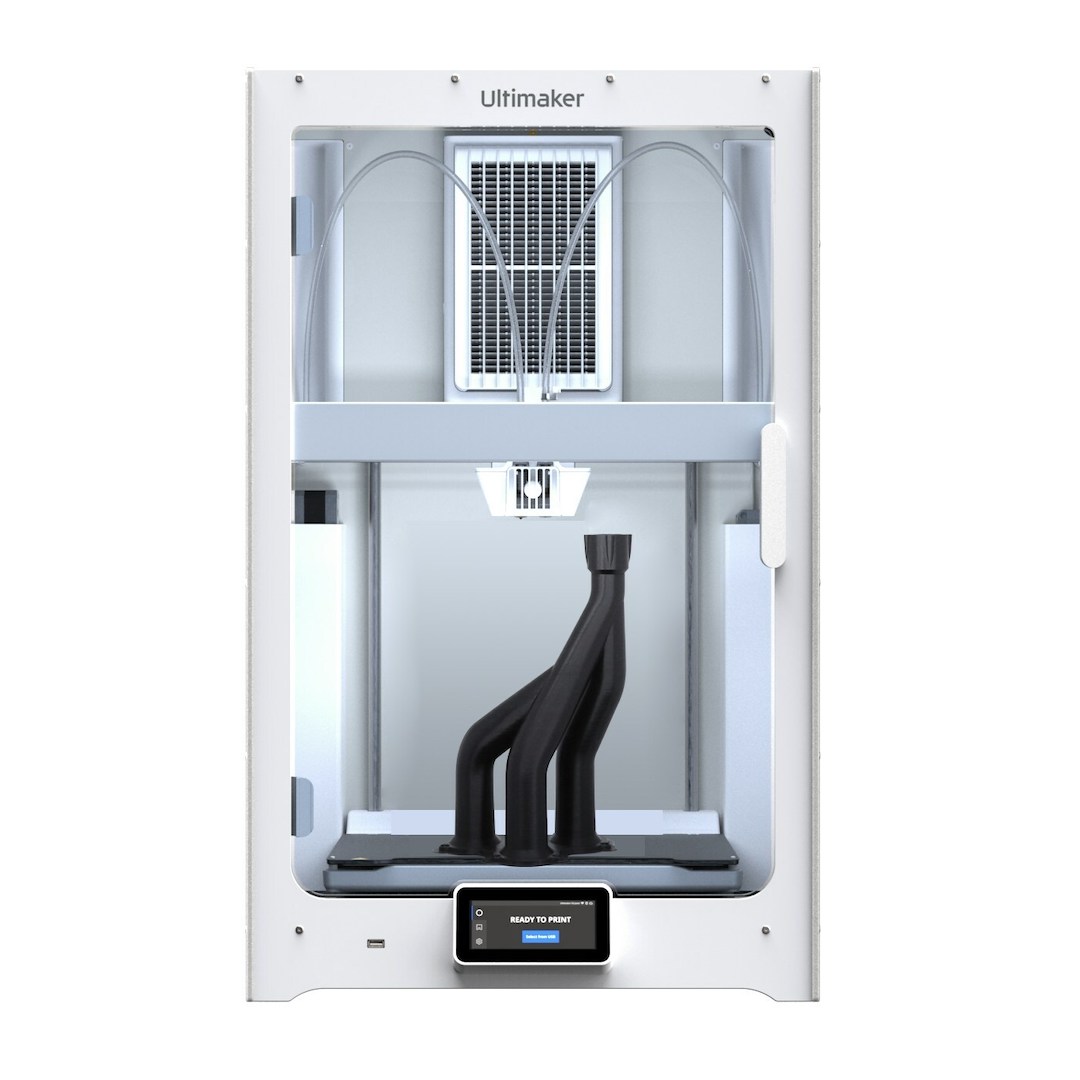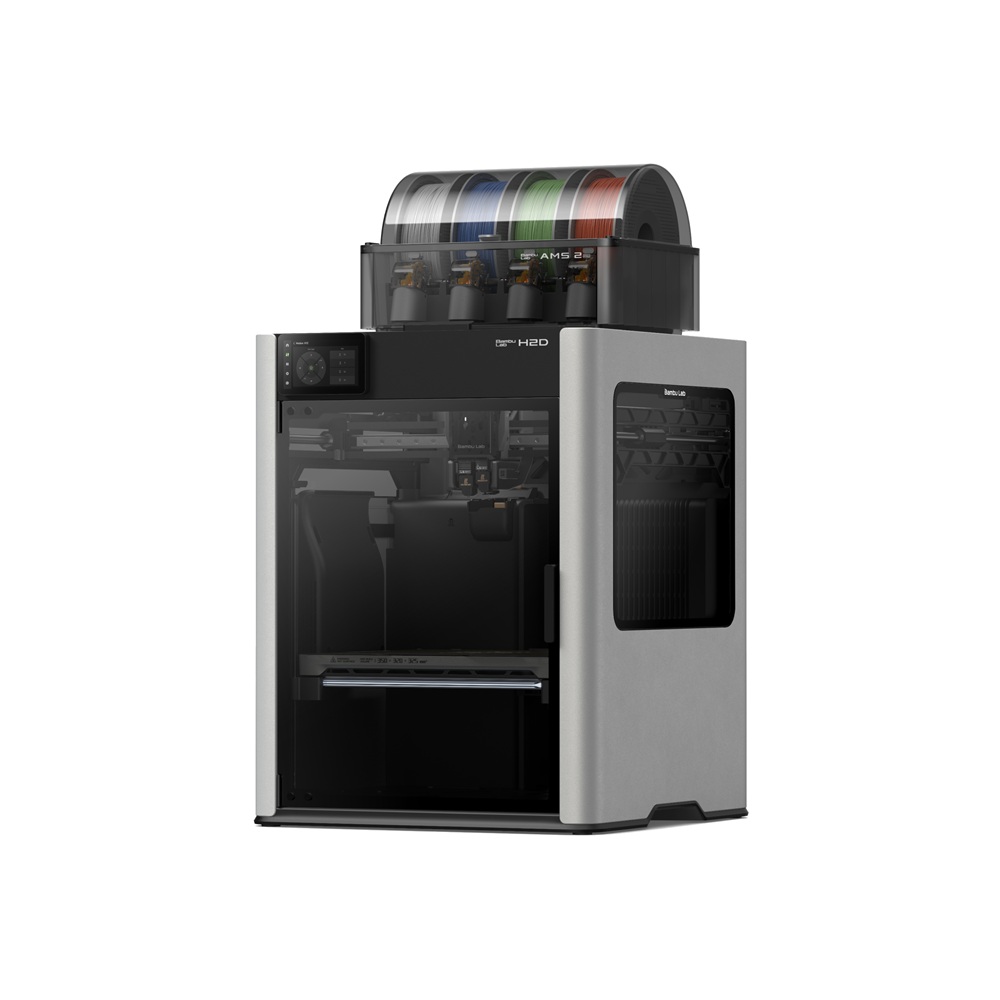Compare S7 vs H2D
Comparison between the best 3D printers
Choose the best 3D printer at the best price. The cheapest 3D printers are here.
Buy a 3D printer here with 3D Fila.
 |
 |
|
| Model | S7 |
H2D |
| Printing Material | Filament | Filament |
| Buy Filament for Ultimaker S7 | Buy Filament forBambu Lab H2D | |
| Estimated price | $8300,00 | $1899,00 |
| Manufacturer | Ultimaker | Bambu Lab |
| Release Year | 2022 | 2025 |
| Print Volume [mm] | 240x330x300 | 350x320x325 |
| Printer Size [mm] | 585x495x800 | 492x514x626 |
| Weight [kg] | 29 | 42,3 |
| Power Loss Recovery | YES | YES |
| Enclosed printer | YES | YES |
| Bed Leveling | Automatic | Automatic |
| Filament End Sensor | YES | YES |
| Bed type | Heated | Heated |
| Power supply system | Bowden | Direct Drive |
| Standard nozzle | 0,4 | 0,4 |
| Maximum Nozzle Temperature [°C] | 280 | 350 |
| Maximum Bed Temperature [°C] | 120 | 120 |
| Maximum printing speed [mm/s] | 180 | 600 |
| Filament holder | YES | YES |
| Camera for supervision | YES | YES |
| Recommended filaments | PLA, ABS, PETG, PC, Nylon, Tritan, PP | PLA, PETG, ABS, ASA, TPU, PVA, Nylon (PA) |
| Recommended slicers | Cura | Bambu Studio |
| Maximum Resolution [mm] | 0,1 | 0,01 |
| Processor | ||
| Display | Display touchscreen 4,7'' | Touchscreen 5'' |
| Power Supply | 500 W | |
| Connectivity | USB / Wi-Fi | Wifi, Bambu bus, Cartão SD |
| Operating systems | Windows, Mac, Linux | Windows, Mac, Linux |
| Date of registration in the system | 2023-01-28 | 2025-03-31 |
| Release date | 2022 | 2025 |
| Extra features | The UltiMaker S7 printer features a series of technological innovations to enhance 3D printing. It incorporates a flexible, magnetic build plate with PEI coating, promoting better adhesion and easier part removal. Its new inductive sensor significantly improves bed leveling, ensuring perpendicular and accurate prints. In addition, the S7 has a higher quality camera for remote monitoring, an integrated air filter, and uses a unique glass door to maintain a constant temperature in the print chamber. The machine is also compatible with the expansion kit for metal printing. | Bambu Labs H2D combines high-speed 3D printing with a chamber heated up to 65 °C, dual extrusion with automatic nozzle switching, an AMS for filament drying and exchange, and AI sensors that detect failures. It offers optional laser and digital cutting capabilities, features intelligent calibration through computer vision, vibration control, enhanced fire safety, and real-time camera monitoring. |
| Support for multiple colors and materials (AMS and CFS) | NO | YES |
Notes * |
||
| Cost-benefit | 1 / 10 | 7 / 10 |
| Hardware | 3.6 / 10 | 7.2 / 10 |
| Tela | . | . |
| Print volume | 4 / 10 | 4 / 10 |
| Performance | 1 / 10 | 5 / 10 |
Conclusion |
| In comparing the Ultimaker S7 and Bambu Lab H2D, it becomes clear that both printers cater to different audiences and needs within the realm of 3D printing. The Ultimaker S7 is a premium offering designed for high-quality, precise printing with advanced features such as a flexible, magnetic build plate and superior camera capabilities for monitoring. It focuses on quality, reliability, and additional functionalities like a glass door for temperature stability and compatibility with metal printing expansion kits. However, this comes at a significantly higher price, making it more suitable for professional users who prioritize these features and are willing to invest accordingly. On the other hand, the Bambu Lab H2D presents itself as a more accessible option that doesn't compromise on speed and capabilities, offering features such as dual extrusion, intelligent calibration, and advanced safety measures. It is designed for users who value speed, versatility, and modern digital capabilities, such as AI sensors and the potential for color and material variety. The H2D's lower cost enhances its appeal, especially for hobbyists and small businesses looking to maximize their investment without sacrificing too much on performance. Ultimately, the choice between the two will depend on the specific needs and budget of the user. For those prioritizing top-tier quality and advanced functionality, the Ultimaker S7 is the clear leader despite its higher price. However, for users seeking a balanced combination of speed, modern features, and affordability, the Bambu Lab H2D presents a compelling case. The decision comes down to aligning each printer's strengths with the user's requirements and financial considerations. |

